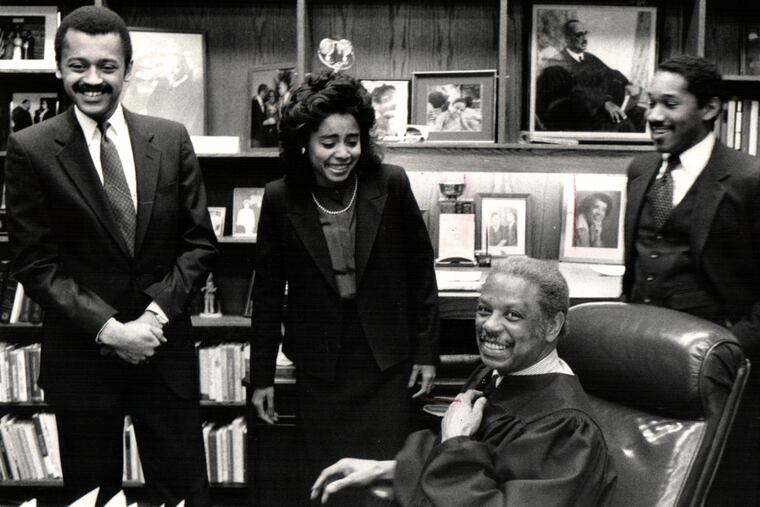Legacy of black judges matters, but Philly didn’t elect any | Opinion
Renee Chenault Fattah clerked for legendary African-American Judge Damon Keith and saw up close how his life experience informed his decisions.

Justice is blind, but not color-blind. No matter our profession, we all are shaped by our life experiences. Some years ago Supreme Court Justice Sonia Sotomayor was criticized for saying that “a wise Latina woman,” given the richness of her experiences, would more often than not reach a better conclusion than a white male who hasn’t lived that life. She was not admitting bias or lack of objectivity on the bench, but rather acknowledging that her experiences, rooted in ethnicity and gender, composed the lens through which she viewed the world.
This is why we champion diversity. Diversity makes our schools, workplaces, and judiciary better. And it is why the May 21 Philadelphia primary in which no African American candidate was elected for either Common Pleas Court judge or Municipal Court judge is so disheartening.
The loss touched a nerve, since I recently returned from Detroit for the funeral of the country’s longest-serving African American Judge. Damon J. Keith of the U.S. Court of Appeals for the Sixth Circuit, authored some of the country’s most important civil rights and civil liberties opinions, challenging segregation, voting-rights suppression, and government overreach. After 9/11, in response to secret deportation hearings, he famously wrote “democracies die behind closed doors." At age 96, Judge Keith was still hearing cases when he passed peacefully in his sleep on April 28.
At the start of my legal career, I clerked for the judge and it remains the highlight of my professional life. The fact that so many of his former clerks, spanning 50 years, were at his funeral speaks to the love and respect we had for him.
In addition to being a lifelong defender of the Constitution, Judge Keith opened doors of opportunity for hundreds of aspiring lawyers of color who otherwise might not have had the opportunity for a coveted judicial clerkship. While some of his clerks, including the former governor and secretary of state of Michigan were white, the vast majority of the judge’s clerks were African American. They have gone on to distinguished careers as judges, partners in law firms, and corporate and nonprofit CEOs. Law professor Lani Guinier, who taught at the University of Pennsylvania Law School before becoming Harvard Law School’s first tenured African American female professor, was one of Judge Keith’s clerks.
Judge Keith recognized that if the nation was to live up to its promise, it was important that those interpreting the law reflect this country’s diversity. Nowhere is this more relevant than in our state courts. According to the American Constitution Society, 90 percent of America’s judicial business is conducted at the state court level.
Pennsylvania is one of only a handful of states that holds partisan elections for judge. How could Philadelphia, a city that is overwhelmingly Democratic and black, fail to elect a single judge of color?
Certainly there is blame to share. The local Democratic Party should have done more to bring awareness to candidates whose resumés showed they were eminently qualified, the media could have done more stories on why judgeships matter, and our schools are sorely lacking in curriculums that teach how a democracy lives or dies by its civic participation.
But ultimately, we in the African American community must shoulder the blame for not learning about the candidates or taking time to vote. Some believe that in a democracy, people get the government they deserve. I believe Philadelphians deserve better and can do better.
Renee Chenault Fattah is a former TV news broadcaster, board member of the Philadelphia Lawyers for Social Equity, and is making a film about Alzheimer’s and other dementias in communities of color.